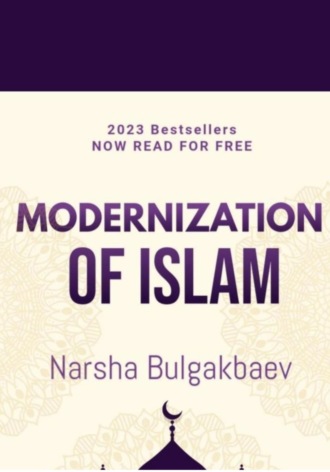
Narsha Bulgakbaev
Modernization of Islam
GOD’S KINGDOM
The seventh heaven is the infinite supreme consciousness of God. Basically there are 7 heavens and 24 levels in total. As for the seven heavens. This division is given to human consciousness because, for example, there are seven layers in the astral field of the Earth. But in addition to the 7 layers, there is also a Spiritual world – the world of inlay spirits. There are 24 levels. This is the Spirit World. Apart from the spiritual world there is a ridiculous material world with 59 levels of density.
How were the 1st, 2nd and 3rd (levels) of the heavens divided? It can be said that the first heaven is our visible Cosmos. The Second and Third Heavens are subtle-material civilizations of different density levels.
The second heaven is the «world of demons». They live at a higher level of density than the visible Cosmos, that is, not in the stars, but at a higher vibrational level. Their bodies are made of fire. He was not human. Man is made of water and clay, because clay contains all the substances found in the human body, silicon, carbon, etc. There is the physical body is made up of the elements contained in the soil. The demon’s body is simply created by a soul called «fire». This energy is not necessarily a burning fire. Plasma is called plasmoids. Plasma is fire. The third heaven is most likely higher vibration plasmoids, the «world of jinn» who follow the path of Allah and believe. The fourth heaven is the astral (barzakh) world.
The fifth heaven is the unrealized Spirit World, the world inhabited by low-vibrational inlays.
The Sixth Heaven is the mid-level Spirits, which we designate from the 9th to the 16th level. The Seventh Heaven is already Paradise, with Angels in it. And the throne of Allah is higher than the Seventh, completely outside the spiritual world. Only a few of the angels can reach it, they are able to unite with the divine consciousness as completely as possible, they are practically indistinguishable from it in terms of properties.
Every Soul living in this world or other worlds or on Earth has the potential to become a supreme Angel if he reaches the highest level spiritually. That is, after the body of the attributes of the Creator (99 artistic names, 6 essences, 8 attributes) is resurrected from the grave and passes through the Terrible Judgment, it immediately rises to a higher level and reaches the point where it can see this Throne itself. All people can reach such a spiritual level whether they want to or not. What I want to say is how blessed Muhammad (pbuh) was to see the face and throne of God.
Those at the 23rd and 24th levels (those at this level are all Spirits) because they have attained a higher spiritual level. Full access is not available to those who have reached level 22. Levels 23 and 24 have full access. What is Tron? The throne is a symbol. Of course, there is no tangible throne that we can imagine. It is a sign of God’s presence everywhere at the same time. When you are so fully integrated, you feel all of humanity as a separate part of your body, so God did not create man in vain. Love all mankind brother. You feel like you created the entire human race. They feel like they made you. If a person has someone to love, life has meaning for him. And to love all humanity, to be a helper as much as possible, this is a great energy. If there are no worlds, then the presence of God within himself, the Laws of Science established by Love, will disappear. You will understand this when you unite yourself with the Creator.
ATTRACTED TO ME
Who should you try to be like? To a famous singer, athlete, businessman who doesn’t need you at all, even if you die? or the one who loves you more than your parents and can protect you from all evil?
Inner light: I am the light of the world. Whoever follows me will never walk in darkness but will have the light of life. I am the Light that illuminates the conscience and consciousness of every individual and leads to the path of truth and correctness. This light is God’s Truth, and that light gives daily guidance with an inner voice.
In many verses of the Qur’an, Allah has called a person who does not worship Him as dead. And here two parallels can be drawn, two main concepts can be distinguished. The first is the connection between life and death. Whoever worships the Creator is a living person. A person who refuses to worship God is dead, that is, spiritually dead, even if he eats and drinks and walks on earth.
The second image is the connection between light and darkness. Light has been given to those who worship Allah. What is the purpose of Inner Light? The purpose of light is to help and assist in reaching Paradise. The light helps to reach the right place in a short time without falling and without bad consequences. That is, the enlightened person knows his destination – Paradise and the right path to it – the Book of God – the Qur’an and the way to get there.
FUNDAMENTALS OF ISLAM
Shahada without knowledge and understanding of the family of the Basics of Iman is just temporary emotions and empty words. Before starting prayer, you need to carefully familiarize yourself with the basic concepts of Iman in order to get the maximum benefit from the prayer you read. The second status of the Islamic religion is the foundations of Islam.
Consists of five principles and often regulates a person’s external qualities and actions:
Reading two testimonies
– (Shahada) «La ilaha illallah Muhammad rasul-Allah»
– Performing five daily obligatory prayers
– Fasting in Ramadan
– Issuance of zakat to a person whose property exceeds a certain amount 5) A once-in-a-lifetime pilgrimage
There are several conditions required to obtain a certificate of acceptance of Islam, the first is «La ilaha illa Allah (There is nothing worthy of worship except Allah).»
– Education that eradicates ignorance;
– Strong faith that eliminates doubts; 3) Acceptance is the skin of denial;
– Skin of disobedience – submission;
– Shirk’s skin – devotion;
– The skin of hypocrisy is honesty;
– The skin of hate is love;
– Denying objects of worship other than Allah and avoiding them, that is, avoiding Shirk
A Muslim knows the meaning of these conditions, does not doubt it, does not deny it, submits to it, is sincere, loves it with all his heart, and also rejects idols and deities other than Allah, then the evidence of accepting Islam will be correct and he will have a chance to achieve the mercy of Allah if this testimony (shahadah) reaches the heart.
The second condition for the certificate of acceptance of Islam is «Muhammad rasul-llah.» There are several conditions for recognizing the mission of the Prophet Muhammad:
– Undoubtedly believing what the Prophet said;
– Obedience to what the Prophet commanded;
– Avoiding things prohibited by the Prophet;
– Do not place anyone’s word higher than the words of the Qur’an, then the words of Muhammad (hadith);
– Do not introduce into religion what it does not prescribe for evil purposes, whether in words, deeds or beliefs;
– Do only what the Prophet has authorized (for example, saying greetings when his name is mentioned)
– Do not pray to the Prophet, do not ask him for help, etc.
– Respect the words of the Prophet and respect his hadiths
Solat (namaz) means «prayer» in Arabic. In Sharia: a set of certain actions and words starting with takbir (the words «Allahu akbar») and ending with taslim (the words «as-salamu alaikum»). Prayer is the most important pillar of Islam after the certificate of acceptance of Islam. Allah, the Most High, made the prayer of the Prophet Muhammad obligatory on the night of Migration over the seven heavens.
Saum (fasting) – linguistic meaning: «to refrain from something.» According to Sharia:
abstaining from food and drink from the time of morning prayer until sunset, as well as from other things that break the fast, with the intention of fasting. The post has two bases:
Avoid activities that break your fast from the time of morning prayer until sunset; Intention to worship Allah during this fast;
Zakat (obligatory charity) – linguistic meaning: «surplus», «growth (of harvest)». In Sharia: a fee levied on the property of a certain group of people that has reached a certain amount. This was considered the cleansing of the soul of God’s servant. And the distribution of zakat is a reason for the unity of the Muslim community, love and unity.
Hajj (pilgrimage) – linguistic meaning: «intention, goal, desire, departure.» In Shariah: Performing religious rituals at specific times in accordance with the Sunnah. Hajj is considered a pillar of Islam, and Muslim scholars unanimously agree that performing Hajj once in a lifetime is mandatory.
Ihsan
Ihsan has one basis: Worship Allah as you see Him, and if you cannot do this, worship as
Allah sees you. (during prayer)
CODE OF LAWS
Islamic Sharia is a set of laws that regulate man’s relationship with God, other people, society and the environment, what is permitted and what is prohibited, and is mandatory according to the Qur’an, Sunnah and the words of the Salaf (in the case of Shiites – Ahl al-Bayt) and ijtihad of scholars. The most important of these laws are the five pillars of Islam (witness, prayer five times a day, 30 days of fasting in the month of Ramadan, obligatory charity and once-in-a-lifetime pilgrimage)
Sharia actions are divided into eight: Duty, Desirability, Sunnah, Mustahab, Muba, Haram, Makrooh, Mufsid. It is the duty of a Muslim to perform the first five of these eight and abstain from the last three.
Debt (fard) is divided into two parts: «Ayn» and «Kifaya»: «Ain fard». Responsibilities are directly assigned to every Muslim and must be fulfilled.
A Muslim must perform these duties personally. One’s duty cannot be fulfilled by another. Like prayer and fasting. Kifaya Fard: duties that fall on the shoulders of all Muslims through the performance of some Muslims, although they are obligatory on all Muslims. However, if no one does, the entire community is responsible. (juma and janaza prayer, defense of the fatherland)
Desirability (wajib)
Wajib are actions that are not required to be performed as a duty, but are determined by solid evidence. For example, making sacrifices, performing Utir prayers (after praying five times a day) and Al’Eed (holiday prayer), etc.
Sunnah is the actions performed by the Prophet Muhammad (peace and blessings of Allah be upon him) and who expressed his gratitude for their accomplishment. The Sunnah is divided into three parts: Muakkadah Sunnah (Verified Sunnah) Gairu Muakkad Sunnah (Unverified Sunnah) Zawaid Sunnah (Excessive Sunnah).
Mustahab – in religious terms, the actions of the Prophet Muhammad, which he sometimes performed and sometimes did not perform. This includes some nafl prayers (additional prayers) and fasting. In addition, it is mustahab to perform the morning two-rakat prayer (fajr) after dawn, to perform the midday four-rakat prayer (zuhr) late, in the heat, until the evening comes, and also to perform the evening three-rakat prayer (maghrib) immediately after the time comes. There is possible reward for those who do it, and no sin for those who do not. Ibn Abidin said that the terms mandub, mustahab and nafil have the same meaning.
Mubah – to do or not to do, there are no religious obstacles, that is, actions according to the will of a person. For example, food, sleep, etc.
Haram are things that are strictly prohibited in Islam. Drunkenness, gambling, adultery, murder, gossip, slander, etc.
Makrooh in the dictionary means something unpleasant, hateful. If expressed in religious language, then this is an unpleasant, bad action from the point of view of religion. This makruh includes actions such as wasting water during ablution and ablution. Makrooh is divided into two parts: Makrooh, which is close to haram (Tahriman makrooh). For example: wasting water during ablution, etc. Makruh is close to Halal (Tanzihan Makruh). For example: rinsing the nose with the right hand, etc.
The mufsid is what disrupts the worship service that has begun. Deliberately committing mufsid results in sin. If it is done by mistake, there is no sin or suffering. This includes actions such as laughing uncontrollably during prayer, etc.
WORD OF GOD
The Qur’an is the word of God, which begins with Surah Fatiha and ends with Surah Nas. This is the word of God revealed to Muhammad, the last prophet of God to mankind. There are 114 suras and 6236 verses in the Quran. The Qur’an was written in literary Arabic and is the basis of Islamic Sharia. Allah promised to preserve the Quran from changes and additions. This includes beliefs, worship, human relationships, etc. The judgments of the issues are stated in a general and individual form. Surah Alak of the Quran is considered the first revelation, and the first verses of Surah Muddassir are considered the first verses of the message. Therefore, some scholars believe that Muhammad became a prophet with the revelation of Surah Alyak and a messenger with the revelation of Surah Muddassir. The verses of the Quran are divided into two parts depending on the reason for the revelation: Ayats revealed by Allah without any reason; Verses revealed in connection with a specific event or for other reasons; The Quran was revealed in fragments over a period of 23 years. Prophet Muhammad ﷺspent most of this time in Mecca. Therefore, scholars divide these verses into «Makkah» and «Medina» verses: The Meccan verses are a harsher style and a shorter version as they are intended for mushriks who oppose Meccan Islam. At the same time, Meccan Ayats often touch upon issues of monotheism, faith in Eternal Life; Medina verses – at this time the number of Muslims increased, often in a mild form, talk about the rulings of Sharia in relation to Muslims. At the same time, as jhad is legalized and the hypocrisy of the hypocrites is exposed, the verses about jhad and hypocrites become more frequent.
SUNNAH
The Holy Quran commands to follow and obey the Prophet Muhammad, therefore the Sunnah is considered the second basis of Islamic Sharia. Sunnah refers to any word, deed or inner support of the Prophet. At first, Prophet Muhammad did not approve of the writing of hadith from him. For example, these words: «Do not write anything in my name except the Koran. And if someone writes something other than the Koran in my name, let him erase it.» However, when his companion named Abdullah ibn Amr asked about this, he pointed to his mouth and said: «Summer! I swear that my soul is in His Hands, nothing but the Truth will come out of this.» And as Hafiz al-Sahawi said In the book Fath al-Mughis, Islamic scholars unanimously allowed the writing of the Sunnah. Recently, a movement of «Koran scholars» has emerged, claiming that the Sunnah has undergone changes and that only the Qur’an should be followed and Shariah should be drawn from it. In response, Muslims who accept the Sunnah cite verses from the Koran itself, calling them to follow the coming prophet. For example: «Verily, he does not speak at will. It is just a revelation that is written (in the heart) ” (Surah Najm, verses 3—4). «Take whatever the Messenger gives you and abstain from what he forbids!» (Surah Al-Hashr, verse 7). In addition, the following hadith was transmitted from the Prophet: «When the hadith reached one person from me, he said: «Between us and you is the Book of God! «We consider what is permitted in it to be halal and what is forbidden to be haram,» he might say. However, in fact, what the Messenger of Allah prohibits is the same as what God himself prohibits!»
Ijma is the unanimous agreement of Muslim scholars in the post-Prophet era. Ijma does not include the actions of the Companions at the time of Prophethood, since the actions of the Companions at that time are in themselves considered evidence of Shariah. If the scholars agree with the decision, no one is allowed to violate it or deny it, because the Prophet said: «My ummah does not intend to go astray.» There are two types of ijma: «Ijma Qatgiy» is ijma with the explicit consent of the ummah. For example: agreement that prayer is obligatory, agreement that adultery is haram, etc. «Ijma Zannii is an ijma that follows something or says nothing. That is, following what one scientist says, other scientists do not say anything or oppose it. There was disagreement among Muslim scholars regarding the confirmation of this type of ijma, that is, accepting it as evidence. Shaykh al-Islam Ibn Taymiyyah says: «Ijma is the unification of the Salaf in something, even if after them the differences intensified and the ummah split.»
Qiyas is a method of ruling by similarity (analogy), widely used in Islamic jurisprudence. Among Muslim scholars, qiyas ranks second after the Koran, Sunnah and Ijma. However, there are permitted and prohibited types of Qiyas. One of the prohibited types is making a judgment based on evidence from the Quran and Sunnah. Ibn Masgud said: «If you rely on Qiyas in matters of religion, you will make many haram things halal and you will make halal things haram.» Allah said (to Satan): What prevented you from prostrating when I commanded you? He replied: I am better than what you created! You created me from fire and him from clay.» Al-Hasan al-Basri and Muhammad ibn Sirin, based on this verse, believed that the first forbidden analogy (qiyas) was used by Iblis (Satan).
Ijtihad: Research and works of a scholar on Shariah. Conditions of a mujtahid (fiqh scholar) when performing ijtihad: Knowledge of the proofs of the fundamentals of Sharia, Quran, Sunnah, etc. are necessary for ijtihad. Knowledge of rulings on the authenticity or weakness of hadith, such as people in the chain of hadith (Isnad) It is necessary to know nasih and mansukh (i.e. verses and hadiths that cancel a ruling), and also know ijma, so as not to make a ruling based on things whose ruling canceled or contrary to ijma. Ability to distinguish between dubious evidence. Knowledge of the meaning of verbal signs such as «general and particular», based on the basics of language and fiqh. Must be able to make judgments based on evidence.





